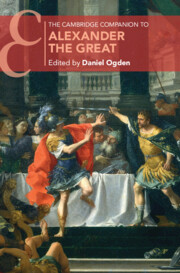Book contents
- The Cambridge Companion to Alexander the Great
- Cambridge Companions to the Ancient World
- The Cambridge Companion to Alexander the Great
- Copyright page
- Dedication
- Contents
- Figures
- Tables
- Maps
- Abbreviations
- Notes on Contributors
- Acknowledgements
- Introduction
- Part I Alexander’s Life and Career
- 1 Alexander’s Birth and Childhood
- 2 The Crises Leading up to Alexander’s Accession
- 3 Alexander and the Greeks
- 4 To the Ends of the World: What the Campaign Was All About
- 5 Alexander and Egypt
- 6 Alexander and the Persian Empire
- 7 Alexander and India
- 8 Alexander’s Death, Last Plans and Burial
- Part II Contexts
- Part III The Historical and Biographical Tradition
- Part IV The Ancient World’s Memory of Alexander
- Alexander’s Timeline 356–321 BC
- References
- Index
- Cambridge Companions to the Ancient World
3 - Alexander and the Greeks
from Part I - Alexander’s Life and Career
Published online by Cambridge University Press: 04 January 2024
- The Cambridge Companion to Alexander the Great
- Cambridge Companions to the Ancient World
- The Cambridge Companion to Alexander the Great
- Copyright page
- Dedication
- Contents
- Figures
- Tables
- Maps
- Abbreviations
- Notes on Contributors
- Acknowledgements
- Introduction
- Part I Alexander’s Life and Career
- 1 Alexander’s Birth and Childhood
- 2 The Crises Leading up to Alexander’s Accession
- 3 Alexander and the Greeks
- 4 To the Ends of the World: What the Campaign Was All About
- 5 Alexander and Egypt
- 6 Alexander and the Persian Empire
- 7 Alexander and India
- 8 Alexander’s Death, Last Plans and Burial
- Part II Contexts
- Part III The Historical and Biographical Tradition
- Part IV The Ancient World’s Memory of Alexander
- Alexander’s Timeline 356–321 BC
- References
- Index
- Cambridge Companions to the Ancient World
Summary
Alexander’s treaties and dealings with the Greek poleis mainly followed the path set by his father’s military success and diplomatic skills. The League of Corinth, an alliance between the states of the Common Peace with the aim of revenge against the Persian invasion of 480–79 BC was renewed by Alexander just after he became king. But the destruction of Thebes in 335 BC soon showed the Greeks that Alexander was ruthless in his authority, and it left a deep impression on them, for the only rebellion against Macedon with was the monor one of Agis III of Sparta, who failed to subdue Antipater’s armies. In Asia Minor, Alexander treated the Greek poleis as it suited him, with rewards for friends and punishments and for foes. During the conquest of the Achaemenid Empire, Alexander settled Greek populations in the new spear-won landscapes, spreading the Greek culture as he travelled, surrounded in his court by artists, philosophers and many other Greek intellectuals.
- Type
- Chapter
- Information
- The Cambridge Companion to Alexander the Great , pp. 55 - 66Publisher: Cambridge University PressPrint publication year: 2024

